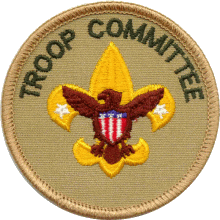Troop Secretary
Qualifications:
Is at least 21 years old, subscribes to the Declaration of Religious Principle, and agrees to abide by the Scout Oath and the Scout Law. Possesses the moral, educational, and emotional qualities that the Boy Scouts of America deems necessary to afford positive leadership to youth. Is a member of the chartered organization other than the unit leader or assistant unit leader. Is appointed by the chartered organization to serve as its official Scouting representative and is registered as an adult leader of the BSA.
Responsibilities:
The Troop Treasurer’s responsibilities are to:
- Help the Troop committee and Scoutmaster establish a sound financial program for the troop with a troop budget plan.
- Open or maintain a bank account in the Troop’s name and arrange for all transactions to be signed by any two of the following: Scoutmaster, Troop Committee Chair, Secretary, or Treasurer.
- Approve all budget expenditures. Check all disbursements against budget allowances, and pay bills by check. The troop committee chair should approve bills before payment.
- Collect dues from Scout Leaders at the Troop’s leaders’ meeting, preferably in sealed envelopes. Open envelopes in the presence of Scoutmasters. Give receipts for these funds, and deposit the money in the bank account.
- Keep up-to-date financial records. Enter all income and expenditures under the proper budget item in the finance section Troopmaster Ledger Software. Credit each Boy Scout with payment of dues. From time to time, compare the records with those of the Scout leaders to make sure they agree. Give leadership in developing a coordinated record-keeping system in the troop.
- Be responsible for thrift training within the troop. Encourage each adult leader to explain the troop financial plan to each boy and his family so that boys will accept responsibility for paying dues and family members will be alert to opportunities for boys to earn dues money and develop habits of thrift.
- On the request of Scout Masters, sympathetically counsel with a boy who does not pay dues, determine the reason, and encourage regular payment. If the boy is unable to pay, work out a plan with the Scoutmaster and Troop Committee so that the boy can earn dues.
- Periodically report on the troop’s financial condition at the monthly Troop leaders’ meeting. Make regular monthly reports to the Troop committee at the Troop leaders’ meeting, and report to the chartered organization as often as desirable on the financial condition of the troop.
- Provide petty cash needed by leaders. Keep a record of expenditures.
- Guide the troop in conducting council-approved troop money-earning projects.

